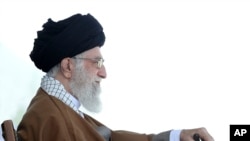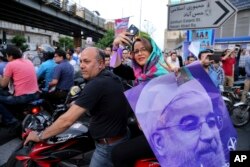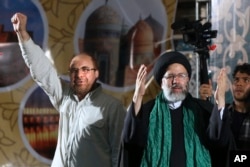Iran's supreme leader called on Wednesday for a high turnout in this week's presidential election, urging voters to head to the polls and send a message to the United States — but stopped short of saying which candidate he prefers of the four remaining in the race.
In a televised speech, Supreme Leader Ayatollah Ali Khamenei said the United States and its allies, including the “pathetic prime minister of the Zionist regime,” or Israel, are closely watching the vote on Friday.
He called the election a “great popular epic,” saying that while the region is “drowned in anxiety,” Iran is “peacefully and safely holding an election.”
“From the U.S. state apparatuses to European powers and regional countries aligned with America, to the pathetic prime minister of the Zionist regime, all are closely watching (the vote) and how and in what spirit” the Iranians will cast ballots, Khamenei said.
Suspicious of US
President Hassan Rouhani, a moderate, is seeking re-election in a vote that will largely serve as a referendum on his outreach to the West, which culminated in the 2015 nuclear deal with world powers. Under the accord, Iran agreed to limit its enrichment of uranium in exchange for the lifting of some economic sanctions.
Despite the deal, Khamenei — Iran's top decision-maker — remains deeply suspicious of the United States and its intentions toward Iran.
Khamenei is believed to favor Rouhani's main challenger, the hard-line candidate Ebrahim Raisi, who has support from major clerical bodies, hard-liners in the establishment as well as allies of former hard-line President Mahmoud Ahmadinejad.
70 percent turnout expected
Interior Minister Abdolreza Rahmani Fazli said turnout is expected to exceed 70 percent. Some 56.4 million people out of a population of 80 million are eligible to vote.
Fazli said vote counting would commence after midnight and that the results would be announced “sooner” than in previous elections. In past elections, results were announced two days later.
Also Wednesday, Hassan Qashqavi, deputy foreign minister in charge of consular affairs and Iranian expatriates, said polling would also be held Friday for Iranian expatriates in 102 countries, including the U.S.
The largest number of polling stations — 55 — would be in America, where more than 1 million Iranians live, he said. In the 2013 election, 20 polling stations opened there for Iranian expats.
Under house arrest
According to reports on opposition website Kalemeh.com, Iranian opposition leaders Mir Hossein Mousavi and Mahdi Karroubi, who have been under house arrest since 2011 after they challenged Ahmadinejad's 2009 re-election, each issued a statement supporting Rouhani.
In his 2013 campaign, Rouhani vowed to lift their house arrests but that promise remains to be fulfilled. Rouhani won the presidential election that year with nearly 51 percent of the vote. Turnout for that vote was 73 percent.
Last week, Iran's official IRNA news agency published the results of a survey in which nearly 64 percent of a 6,047 person sample group said they will be voting, while 20 percent said they were undecided.
Historically, the more Iranians who cast ballots, the greater the chance a reformist or a moderate like Rouhani will be elected.
Besides Rouhani and his rival Raisi, two other candidates — Mostafa Hashemitaba, a pro-reform figure who previously ran for president in 2001, and Mostafa Mirsalim, a former culture minister — are in the race but are widely expected to drop out before polling starts.
Critical of Revolutionary Guard
At a rally in Raisi's hometown of Mashhad on Wednesday, Rouhani urged the country's powerful Revolutionary Guard and other armed forces to remain impartial in the election and keep their “distance from political games.” He also demanded that the state broadcasting company remain neutral.
Rouhani has increasingly criticized the Revolutionary Guard — most recently on Monday, when he said the paramilitary force was abusing public funds to bus Raisi's supporters to his rallies.
And during a presidential debate last week, he accused the paramilitaries of seeking to sabotage the nuclear deal, pointing to the Revolutionary Guard's launch of a ballistic missile bearing the words “Israel must be wiped out” in Hebrew in March 2016.
Sanctions to be extended
Later Wednesday, the Trump administration said it will extend sanctions relief for Iran granted under the nuclear deal but that it would also impose new and unrelated economic penalties over Iran's ballistic missile activity. The decision came just before the Obama administration's last six-month waiver was to expire.
By pairing the waiver of old sanctions with an announcement of new ones, the administration is trying to show it's being tough on Iran even as it adheres to the nuclear deal for now. President Donald Trump has said he's reviewing the deal's future.
The new sanctions target Iranian military officials and others accused of supplying Iran with materials for ballistic missiles.













